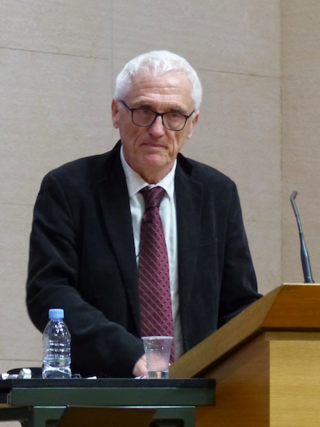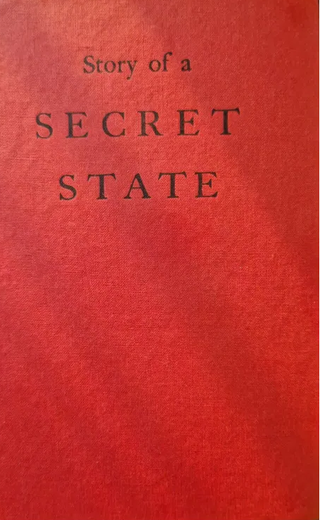
The Partitions of Poland were three partitions of the Polish–Lithuanian Commonwealth that took place toward the end of the 18th century and ended the existence of the state, resulting in the elimination of sovereign Poland and Lithuania for 123 years. The partitions were conducted by the Habsburg monarchy, the Kingdom of Prussia, and the Russian Empire, which divided up the Commonwealth lands among themselves progressively in the process of territorial seizures and annexations.

The Battle of Warsaw, also known as the Miracle on the Vistula, was a series of battles that resulted in a decisive Polish victory in 1920 during the Polish–Soviet War. Poland, on the verge of total defeat, repulsed and defeated the Red Army.

The history of Poland from 1939 to 1945 encompasses primarily the period from the invasion of Poland by Nazi Germany and the Soviet Union to the end of World War II. Following the German–Soviet non-aggression pact, Poland was invaded by Nazi Germany on 1 September 1939 and by the Soviet Union on 17 September. The campaigns ended in early October with Germany and the Soviet Union dividing and annexing the whole of Poland. After the Axis attack on the Soviet Union in the summer of 1941, the entirety of Poland was occupied by Germany, which proceeded to advance its racial and genocidal policies across Poland.

The Warsaw Uprising, shortly after the war also known as the August Uprising, was a major World War II operation by the Polish underground resistance to liberate Warsaw from German occupation. It occurred in the summer of 1944, and it was led by the Polish resistance Home Army. The uprising was timed to coincide with the retreat of the German forces from Poland ahead of the Soviet advance. While approaching the eastern suburbs of the city, the Red Army halted combat operations, enabling the Germans to regroup and defeat the Polish resistance and to destroy the city in retaliation. The Uprising was fought for 63 days with little outside support. It was the single largest military effort taken by any European resistance movement during World War II.

Ivor Norman Richard Davies is a British and Polish historian, known for his publications on the history of Europe, Poland and the United Kingdom. He has a special interest in Central and Eastern Europe and is UNESCO Professor at the Jagiellonian University, professor emeritus at University College London, a visiting professor at the Collège d'Europe, and an honorary fellow at St Antony's College, Oxford. He was granted Polish citizenship in 2014.

The Warsaw Uprising, in 1944, ended in the capitulation of the city and its near total destruction by the German forces. According to many historians, a major cause of this was the almost complete lack of outside support and the late arrival of the support which did arrive. The only support operation which ran continuously for the duration of the Uprising were night supply drops by long-range planes of the Royal Air Force (RAF), other Commonwealth air forces, and especially units of the Polish Air Force (PAF), which had to use distant airfields in Italy and so had very limited effect.

The Trial of the Sixteen was a staged trial of 16 leaders of the Polish Underground State held by the Soviet authorities in Moscow in 1945. All captives were kidnapped by the NKVD secret service and falsely accused of various forms of 'illegal activity' against the Red Army.
Marek Jan Chodakiewicz is a Polish-American historian specializing in Central European history of the 19th and 20th centuries. He teaches at the Patrick Henry College and at the Institute of World Politics. He has been described as conservative and nationalistic, and his attitude towards minorities has been widely criticized.

The Polish Committee of National Liberation, also known as the Lublin Committee, was an executive governing authority established by the Soviet-backed communists in Poland at the later stage of World War II. It was officially proclaimed on 22 July 1944 in Chełm, installed on 26 July in Lublin and placed formally under the direction of the State National Council. The PKWN was a provisional entity functioning in opposition to the London-based Polish government-in-exile, which was recognized by the Western allies. The PKWN exercised control over Polish territory retaken from Nazi Germany by the Soviet Red Army and the Polish People's Army. It was sponsored and controlled by the Soviet Union and dominated by Polish communists.

Jan Tomasz Gross is a Polish-American sociologist and historian. He is the Norman B. Tomlinson '16 and '48 Professor of War and Society, emeritus, and Professor of History, emeritus, at Princeton University.

The Polish Legions were several Polish military units that served with the French Army in the Napoleonic era, mainly from 1797 to 1803, although some units continued to serve until 1815.

In Poland, the resistance movement during World War II was led by the Home Army. The Polish resistance is notable among others for disrupting German supply lines to the Eastern Front, and providing intelligence reports to the British intelligence agencies. It was a part of the Polish Underground State.

Roger Moorhouse is a British historian and author.

The Pinsk massacre was the mass execution of thirty-five Jewish residents of Pinsk on April 5, 1919, by the Polish Army. The Polish commander "sought to terrorize the Jewish population" after claiming to being warned by two Jewish soldiers about a possible Bolshevik uprising. The event occurred during the opening stages of the Polish–Soviet War, after the Polish Army had captured Pinsk. The Jews who were executed had been arrested while meeting in a Zionist center to discuss the distribution of American relief aid; the meeting was described by the Poles as an "illegal gathering". The Polish officer-in-charge ordered the summary execution of the meeting participants without trial, and based on the information about the gathering's purpose that was founded on hearsay. The officer's decision was defended by high-ranking Polish military officers, but was widely criticized by international public opinion.

White Eagle, Red Star: The Polish–Soviet War, 1919–20 is a 1972 book by Norman Davies covering the Polish–Soviet War. The monograph is Davies's first book.
The Kraków Uprising was a planned but never realized uprising of the Polish Resistance against the German occupation in the city of Kraków during World War II.
On May 21, 1945, a unit of the Polish Home Army, led by Colonel Edward Wasilewski, attacked a Soviet NKVD camp located in Rembertów in the eastern outskirts of Warsaw. Hundreds of Polish citizens had been imprisoned there, including members of the Home Army and other members of the underground resistance. Prisoners at the camp were being systematically deported to Siberia. As a result of the attack, all of the Polish political prisoners were freed from the camp by the pro-independence resistance.

During the German Occupation of Poland (1939–1945), the Nazis brutally suppressed the Catholic Church in Poland, most severely in German-occupied areas of Poland. Thousands of churches and monasteries were systematically closed, seized or destroyed. As a result, many works of religious art and objects were permanently lost.

Story of a Secret State is a 1944 book by Polish resistance Home Army courier Jan Karski. First published in the United States in 1944, it narrates Karski's experiences with the Polish Resistance, and it is also one of the first book accounts of the German occupation of Poland, including the Holocaust in Poland.
This is a select bibliography of English language books and journal articles about the history of Poland during World War II. A brief selection of English translations of primary sources is included. Book entries have references to journal articles and reviews about them when helpful. Additional bibliographies can be found in many of the book-length works listed below; see Further Reading for several book and chapter-length bibliographies. The External Links section contains entries for publicly available select bibliographies from universities. This bibliography specifically excludes non-history related works and self-published books.















